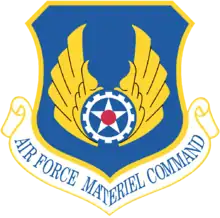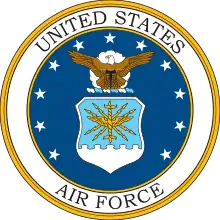711th Human Performance Wing
The 711th Human Performance Wing (711 HPW) is a wing of the United States Air Force based at Wright-Patterson Air Force Base near Dayton, Ohio.
| 711th Human Performance Wing | |
|---|---|
 | |
| Active | March 2008 — present |
| Country | United States |
| Branch | Air Force |
| Type | Human |
| Size | 2000 |
| Part of | Air Force Materiel Command |
| Garrison/HQ | Wright-Patterson AFB |
| Commanders | |
| Current commander | Brig Gen James H Dienst |
Air Force officials redesignated the inactive Harry G. Armstrong Aerospace Medical Research Laboratory, or AAMRL, as the 711th HPW and activated it on March 26, 2008, as one of 10 entities moving under the control of the Air Force Research Laboratory.[1] The AF Aerospace Medical Research Laboratory (AAMRL) was constituted on 20 Aug 1979, and activated 8 Sept 1979. The AAMRL was the predecessor organization of the RHC & RHP Divisions as they existed in 2008. The Laboratory was redesignated the Harry G. Armstrong Aerospace Medical Research Laboratory 1 Jan 1985, and inactivated on 13 December 1990.[2]
Mission
The mission of the 711 HPW is to advance human performance in air, space, and cyberspace through research, education, and consultation. The Wing supports the most critical Air Force resource - the operational military forces. The Wing's primary focus areas are aerospace medicine, human effectiveness, science and technology, and human systems integration.[3] In conjunction with the Naval Medical Research Unit-Dayton (NAMRU-D) and surrounding universities and medical institutions, the 711 HPW functions as a Joint Department of Defense (DoD) Center of Excellence for human performance operating in a university model of education and training, research, and consultation.[4] The 711 HPW was activated in March 2008 in response to the 2005 Base Realignment and Closure (BRAC) directives.[4]
Subordinate organizations
The 711 HPW is located at Wright-Patterson Air Force Base, Ohio and consists of three Mission Units:[4]
Primary Mission Areas
To achieve its mission of advancing human performance in air, space, and cyberspace through research, education, and consultation, the 711 HPW has four Primary Mission Areas (PMAs):[6]
- Airman Health and Performance
The convergence of science, medicine, and engineering to enhance, optimize, and sustain the physical, psychological, cognitive, and behavioral states across the Airman’s lifecycle to achieve airpower dominance.
- Airman-Machine Teaming
Airmen and machines working together to accomplish the mission with greater effectiveness and efficiency than either entity can achieve on its own.
- Force Protection
Mitigation of harmful and stressing mission environments, while sustaining the performance and ensuring the safety of Airmen through research, consultation, and integration advancements.
- Education and Training
Prepare diverse learners in a stimulating academic environment to perform the mission anytime, anywhere, and in the most demanding circumstances. Apply and extend learning and assessment science, technologies and applications coupled with policy, and operational experience, to create research-driven, agile and relevant curricula for persistent readiness and lifelong learning.
These PMAs cut across the 711 HPW’s organizational lines and are aligned with USAF and DoD strategic direction.
Bases stationed
- Wright-Patterson Air Force Base, Ohio
- JBSA Fort Sam Houston, Texas
References
- http://www.usafunithistory.com/PDF/0700/711%20HUMAN%20PERFORMANCE%20WG.pdf, accessed January 2021.
- "711th Human Performance Wing and USAF School of Aerospace Medicine: A Center of Excellence in Aerospace Medicine, 24 April 2008, presentation accessed via health.mil, January 2021.
- 711 HPW (2 November 2015). 711 HPW Capabilities Guide. 711 Human Performance Wing. p. 85.
- "WPAFB Unveils New 711 HPW Complex". www.whio.com. 1 June 2011. Archived from the original on 11 March 2016. Retrieved 10 March 2016.
- "Wright-Patterson Air Force Base - USAFSAM". www.wpafb.af.mil. Retrieved 10 March 2016.
- 711 HPW (2 November 2015). 711 HPW Capabilities Guide. 711 Human Performance Wing. pp. 8–9.

